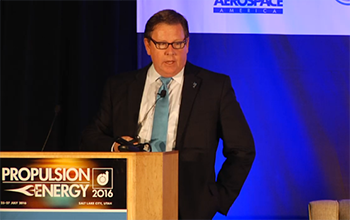Gleaning Propulsion Lessons from History Written 26 July 2016
Speakers: Eric Besnard, professor of mechanical and aerospace engineering, California State University, Long Beach; Stephen Heister, Raisbeck distinguished professor and director of the Maurice J. Zucrow Laboratories, Purdue University; Allan McDonald, aerospace consultant and author of “Truth, Lies, and O-Rings: Inside the Space Shuttle Challenger Disaster”; John Steinmeyer, business development director, Orbital ATK
By Ben Iannotta, Aerospace America Editor-in-Chief

History underscores the stakes of propulsion engineering no more so than in the case of the 1986 Challenger explosion, but history also offers subtler, nontragic lessons at the university and corporate levels.
This range of lessons was discussed during the session “Liquid Rocket Propulsion: Lesson Learned” on July 26 at the 2016 AIAA Propulsion and Energy Forum in Salt Lake City.
Eric Besnard, a professor at California State University, Long Beach, offered advice for those at other universities who might be looking to establish a hands-on, educational rocketry program.
He said his experience with CALVEIN, the California Launch Vehicle Education Initiative, shows that it is best to avoid letting students manage such an endeavor.
“They tend to have great goals,” but “their goals tend not be realistic,” Besnard said.
Being faculty-led, he said, gives access to “more structured resources,” such as government grants.
“You have a much more sustainable program,” he explained.
Will students still be as engaged? Yes, he said, adding, “If you have exciting stuff to do, they’ll be interested.”
Besnard showed a video of a small rocket powered by an odd-looking aerospike engine flying out of control and crashing a few meters from the launch pad. Another lesson, he said, is that students still learn a lot from failure.
Stephen Heister, a professor at Purdue University and director of the school’s Maurice J. Zucrow Laboratories campus, recalled the hard-charging attitude of the facility’s namesake.
He said Zucrow, who retired in 1966, once waged an “epoch battle” with a rival at Princeton University over the proper interpretation of some technical data.
The argument grew so heated that someone had to step in and calm it.
“It was a different era,” Heister said, one in which engineers and scientists were expected to say “what you really think.”
He added: “We don’t see that much of this these days. I’m not sure that’s good.”
John Steinmeyer, business development director at Orbital ATK, bemoaned that “international cooperation” among U.S. and foreign rocketry companies “has fallen out of favor” and that in some quarters it is “even viewed as politically incorrect.”
He recalled previous collaborative efforts in which he’s been involved, including the Sea Launch rocket venture with Ukraine and Russia and work by U.S. and Japanese engineers to create propellant tanks for the U.S. Delta 3 and Japanese H-2A rockets.
Why bother to undertake initiatives like this, given all the export and information-sharing restrictions? Steinmeyer said the collaboration proved to be a time saver. U.S. engineers were able to deliver hardware for the Delta 3 and later the Delta 4 Medium to meet “ambitious launch dates.” In the case of Sea Launch, those involved with the venture were ready to meet what in the early 2000s was expected to be “a significant increase in commercial launch demand.” The demand did not entirely bear out, and Sea Launch operations are now in hiatus for financial reasons, but the lesson is still true, Steinmeyer said.
The session closed with a presentation by Allan McDonald, who was a manager at Morton Thiokol, the company that made the shuttle’s solid rocket motors, at the time of the Challenger explosion. In his retirement, McDonald has made a mission out of urging engineers to speak their minds about safety concerns. During his presentation, he gave detailed recollections about how NASA’s Mission Management Team was not made aware of the seriousness of the concerns engineers had about launching on an unusually cold January morning in Florida.
He advised engineers to speak up the next time a case like this arises.
“You’ll have no regrets, and you’ll be able to sleep well at night,” he said.
